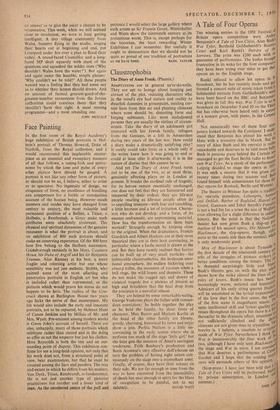A Tale of Four Operas
THE winning entries in the 1951 Festival of Britain opera competition were Arthur Benjamin's A Tale of Two Cities, Alan Bush's Wat Tyler, Berthold Goldschmidt's Beatrice Cenci and Karl Rankl's Deirdre of f the Sorrows. The prize was £200 each with no guarantee of performance. The kudos brotel frustration in its wake for the four compose(5,; they have been trying ever since to get their operas on to the English stage.
Rankl refused to allow his opera to be broadcast, but he has recently made and Pc!' formed a concert suite of music taken from it' Substantial ektracts from Goldschmidt's Welt have been heard on the BBC and Benjf was given in full this way. Weil Tyler is to be broadcast on December 9 and 10 on the Third' but has otherwise been heard only in extract at a concert given, with piano, in the Congo) Hall.
Not unnaturally two of these four corn' posers looked towards the Continent. I under stand that Benjamin has placed his work at Metz with a premiere due in March. But the story of Alan Bush and his opera(s) is rather remarkable and deserves to be told more folly Bush is persona grata behind the Curtain an managed to get the East Berlin radio to broad' cast Wat Tyler. As a result of the performance Leipzig decided to stage the opera in 1953 It was such a success that it was given ove', twenty times during two seasons and Bush found himself with commissions for three fur' ther operas for Rostock, Berlin and Weimar. The theatre at Weimar has quite a tradition for operatic premieres; Lohengrin, Sants°1 and Delilah, Barber of Baghdad. Hansel an Gretel, Guntram and Ethel Smyth's Fat reasi' is not a bad list for a town the size of Watf°td. even allowing for a slight difference in culttaat history. But the point is that the National' theater has now given Bush a slap-up Prot duction of his second opera, Die Miinner Blackmoor; the slap-upncss, though, role' more to the scenic side than the musical, Wbrch is only moderately good. Men of Blackmoor is about Tyneside 1,111 the first decade of the nineteenth centurY ant tells of the struggles of pioneer strikers tb better conditions among the The n miners. The , is thumped surprisingly little and iqnnc; Bush's libretto gets on with the plot wilic„11 shows how• the strike altered the lives of pairs of lovers. Bush's music has hex One One' increasingly warm, national and hurna ,t Admirers of his early string quartet Dialtuv.a'. will be astonished at the lyrical expansivene- Whoic of the love duet in the first scene; the of the first scene is magnificent music. same intellectual skill and lyrical quality tinues throughout the opera but there is fl al° fac thereafter in the dramatic effect; situations not sufficiently clinched and the obciralis climaxes are not given time to crystallise brevity is, I believe, a reaction to critiei05 made of Wat Tyler. Nevertheless I think Wat is immeasurably the finer work of ir two, although I have only seen Blackmoor op the stage and War in score. I am convincl., that Wat deserves a performance at CnyeA" Garden and I hope that the coming 103; casts will persuade others of this opinion' (Stop-press: I have just been told that 3e1 Tale of Two Cities will be performed, bn0 by private subscription, in London summer.)
JOHN 011 JOHN 011


































 Previous page
Previous page